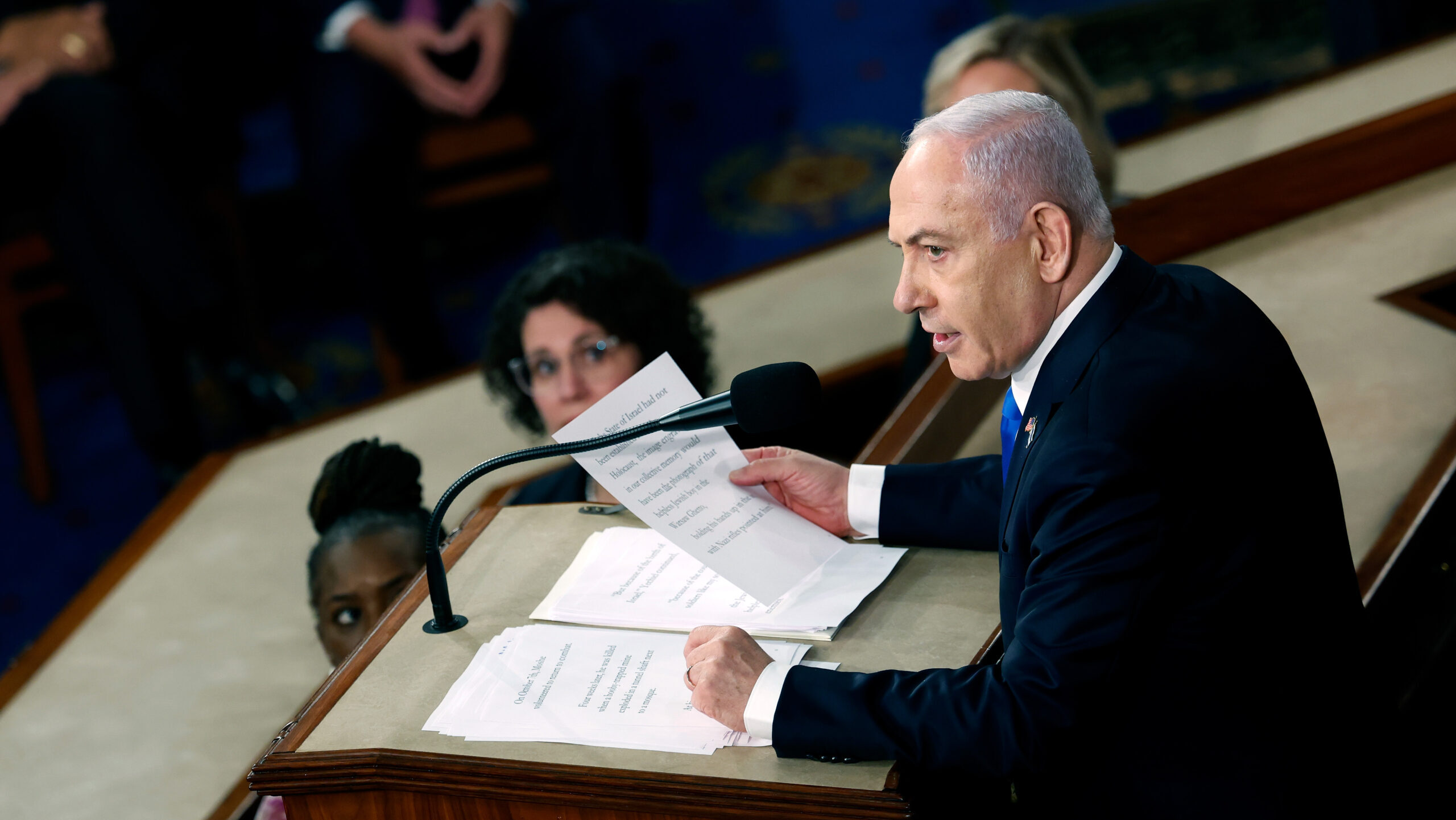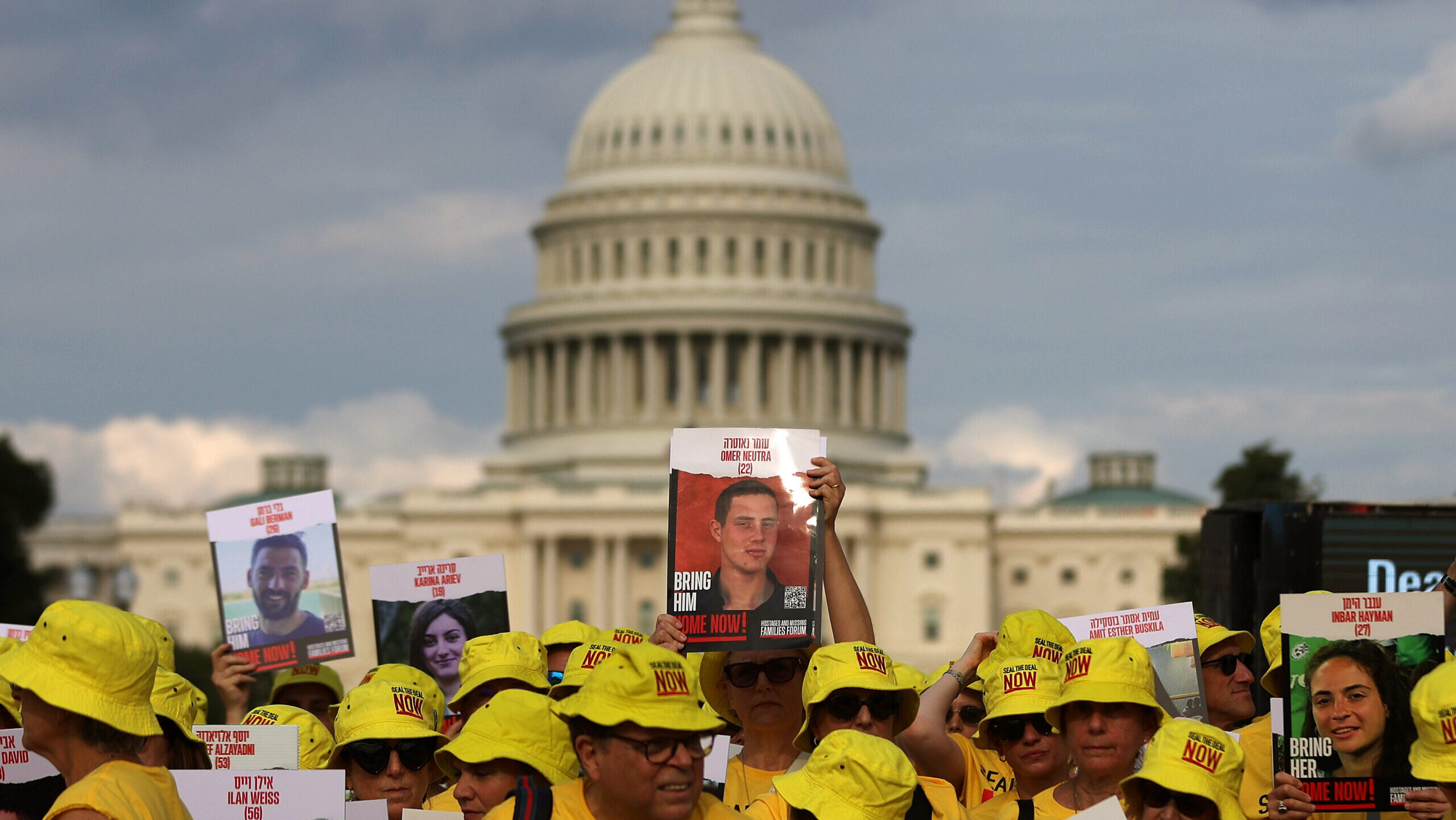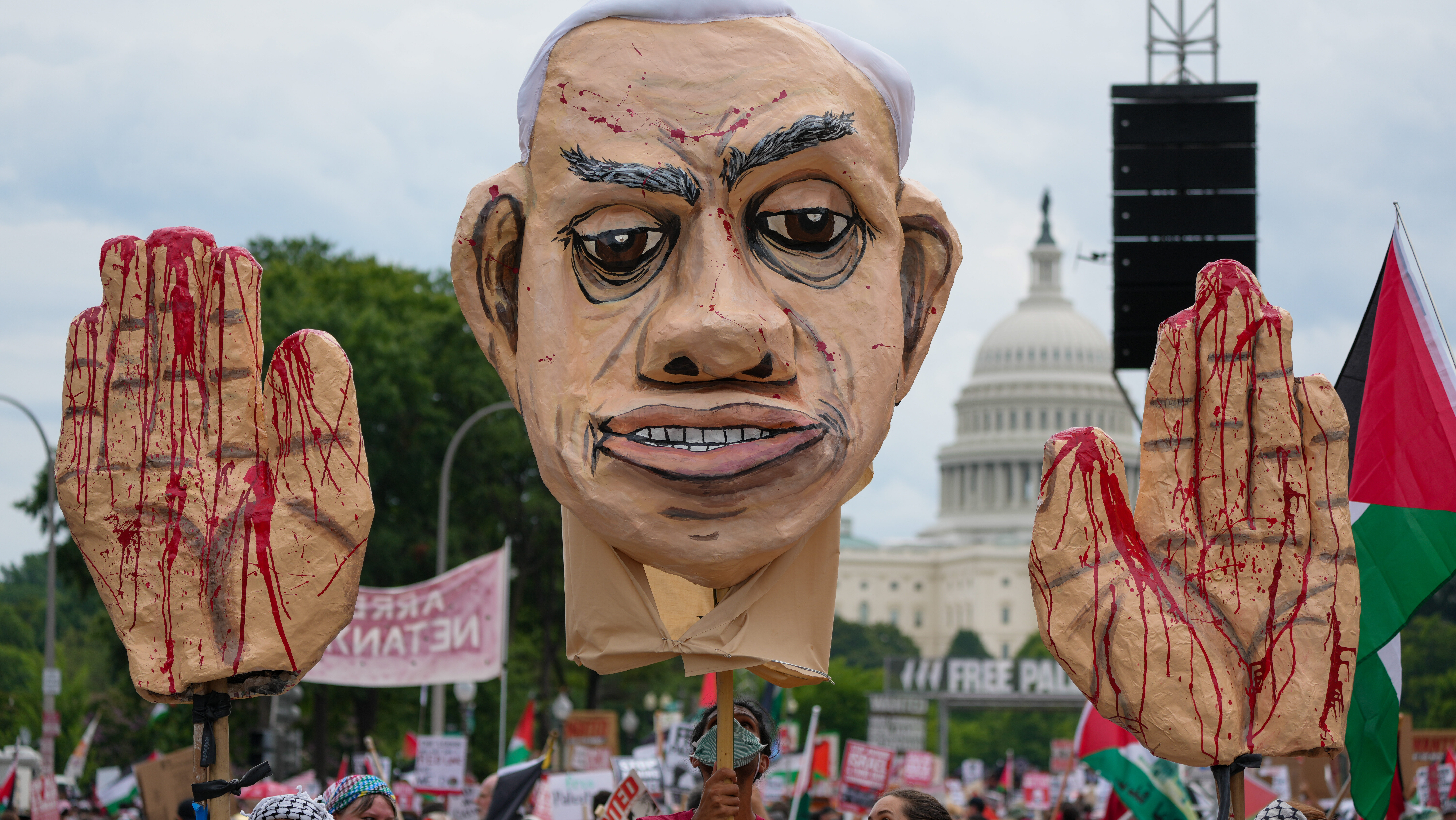Prime Minister Benjamin Netanyahu’s address to the US Congress on Wednesday was met with massive applause and delivered with poise and passion. However, as many analysts have noted, the speech lacked new policy direction and missed opportunities to achieve significant goals.
Instead of accomplishing concrete results, it merely reinforced existing support.
“Netanyahu believes that now having surpassed any world leader in history in addresses to a joint session of Congress, his legacy has been burnished,” said Israel Policy Forum’s Michael Koplow. “What his empty and substance-free speech really demonstrated, however, is that all he has left are words rather than accomplishments.”
The prime minister dedicated much of his speech to defending Israel against the global criticism and attacks it has faced since the October 7 Hamas massacre and nearly 300 days of war. He successfully used the opportunity to position Israel on the world stage better—”It was a great rah, rah speech,” Newsweek columnist Marc Schulman told The Media Line—but he missed many opportunities to effect change.
I am not really sure ultimately what the purpose of the speech was. Will it stop the International Criminal Court [from targeting him for war crimes]? I don’t think so. Will it stop Israel’s enemies [from attacking]? I don’t think so.
“I am not really sure ultimately what the purpose of the speech was,” Schulman said. “Will it stop the International Criminal Court [from targeting him for war crimes]? I don’t think so. Will it stop Israel’s enemies [from attacking]? I don’t think so.
“Israel has always had support from Congress. The more than 80 people who did not come in protest—some of them who are anti-Israel but most because they are anti-Netanyahu—will it change their minds?” Schulman continued. “Probably not.”
What did Netanyahu cover in his one-hour speech to Congress? Here are the key takeaways.
Iran: ‘Our enemies are your enemies’
The prime minister emphasized to the American people that Israel and the US share a common enemy, which is not the Palestinians but Iran. He reiterated this point throughout his speech. However, Netanyahu did not present a plan to stop Iran.
“If you remember one thing from this speech, remember this: Our enemies are your enemies, our fight is your fight, and our victory will be your victory,” Netanyahu said. “That’s why the mobs in Tehran chant’ Death to Israel’ before they chant ‘Death to America.’ For Iran, Israel is first, and America is next. So, when Israel fights Hamas, we’re fighting Iran. When we fight Hezbollah, we’re fighting Iran. When we fight the Houthis, we’re fighting Iran. And when we fight Iran, we’re fighting the most radical and murderous enemy of the United States of America.”
Netanyahu’s main point was that Israel is not fighting the Palestinians, but Iran, Dan Diker, president of the Jerusalem Center for Public Affairs, explained to The Media Line. He said Netanyahu aimed to remind the American people of Iran’s intentions to destabilize the region through terrorism and extremism.

Israeli Prime Minister Benjamin Netanyahu addresses a joint meeting of Congress in the chamber of the House of Representatives at the US Capitol on July 24, 2024, in Washington, DC. (Anna Moneymaker/Getty Images)
‘Rejecting path’ toward Saudi deal
The prime minister outlined a vision for an “Abraham Alliance,” signaling a push for normalization with Saudi Arabia—a legacy he desires and one President Joe Biden would also support as he nears the end of his term. However, Netanyahu jeopardized this opportunity by failing even to suggest that Israel might one day accept Palestinian sovereignty.
Koplow explained that Netanyahu is unwilling to make tangible concessions toward Palestinian statehood, fearing that doing so would destabilize his coalition. Instead, he seeks normalization with minimal gestures toward peace.
“In the wake of the Gaza war, the Saudis need some signal from Israel that it will restore a political horizon for Palestinian statehood, and the Biden Administration and Senate Democrats need tangible territorial steps from Israel on the ground to provide Palestinians with more sovereignty and signal that the situation is moving toward two states rather than toward one,” Koplow wrote. “Yet, as Netanyahu made clear by the notable absence in his speech of any indication that he is willing to give anything in return, he is rejecting that path since he is terrified that it will cost him his coalition when Bezalel Smotrich and Itamar Ben Gvir bolt in protest. Instead, he is trying to get normalization in return for the shallowest rhetorical flourishes about peace, which is not, and should not be, enough to win him this prize.”
Last week, Israel’s far-right Knesset voted to reject the establishment of a Palestinian state under any conditions. On its own, this decision undermines Israel’s stance that it seeks peace but lacks a willing partner. Moreover, by the prime minister not even suggesting that this decision could be reversed—”not next year or next week, but a general statement,” as Schulman said—a deal with Saudi Arabia will likely be delayed.
Hostages: ‘We will fight until we achieve victory’
This holiday season, give to:
Truth and understanding
The Media Line's intrepid correspondents are in Israel, Gaza, Lebanon, Syria and Pakistan providing first-person reporting.
They all said they cover it.
We see it.
We report with just one agenda: the truth.


The return of the 120 hostages still held in Gaza is seemingly the most critical issue for the Israeli public. Shortly after the prime minister’s speech, the IDF confirmed that troops had recovered the bodies of five hostages and a soldier who had been killed on October 7. It is believed that more than a third of the 116 hostages remaining in Gaza are dead.
However, Netanyahu did not address the ongoing efforts to free the remaining hostages in detail. Instead, he took credit for the recent covert rescue of four hostages and suggested that Israel will continue its battle until the end – deal or no deal.
“Two months ago, I authorized a breathtaking commando rescue operation. Our special forces, including a heroic officer named Arnon Zmora, who fell in this battle, rescued Noa [Argamani] and three other hostages,” the prime minister said, pointing to Argamani, who accompanied him on the trip.
On the one hand, Netanyahu said, “I will not rest until all their loved ones are home. All of them.” On the other hand, he pledged “to all the bereaved families of Israel, some of whom are in this hall today, the sacrifice of your loved ones will not be in vain. It will not be in vain because for Israel, ‘never again’ must never be an empty promise. It must always remain a sacred vow. And after October 7, ‘never again’ is now.”
He added, “I promise you this: no matter how long it takes, no matter how difficult the road ahead, Israel will not relent. Israel will not bend. We will defend our land. We will defend our people. We will fight until we achieve victory. Victory of liberty over tyranny, victory of life over death, victory of good over evil. That’s our solemn commitment.”

People hold pictures of Israeli hostages during a vigil on the National Mall on July 23, 2024 in Washington, DC. (Justin Sullivan/Getty Images)
Day after: A ‘demilitarized and deradicalized Gaza’
Netanyahu outlined a vague vision for Gaza’s post-war future, a key demand from US leaders and lawmakers. He proposed a plan for a demilitarized and deradicalized Gaza, emphasizing that while Israel does not intend to resettle the area, it will maintain strict security control over the enclave.
“The day after we defeat Hamas, a new Gaza can emerge,” Netanyahu said. “My vision for that day is of a demilitarized and deradicalized Gaza. Israel does not seek to resettle Gaza. But for the foreseeable future, we must retain overriding security control there to prevent the resurgence of terror to ensure that Gaza never again poses a threat to Israel.
“Gaza should have a civilian administration run by Palestinians who do not seek to destroy Israel,” the prime minister added. However, he failed to address one of the thorniest disagreements between the US and Israel over post-war Gaza: just who those administrators will be.
‘Geared toward a Democratic constituency’
Netanyahu aimed to win over undecided Democrats by highlighting Israel’s multiculturalism and diversity, emphasizing efforts to minimize civilian casualties, and showcasing Israel’s provision of humanitarian aid to Gaza, Gideon Israel, president of the Jerusalem Washington Center, told The Media Line.
A lot of the speech was geared toward that Democratic constituency—for those who support Israel to be more active in their support and hopefully get some of those sitting on the fence.
“A lot of the speech was geared toward that Democratic constituency—for those who support Israel to be more active in their support and hopefully get some of those sitting on the fence,” Israel said.
Netanyahu brought with him to Washington Lieutenant Avichail Reuven, an Ethiopian soldier, who Netanyahu said ran eight miles to fight on the frontlines on October 7. He also showcased Bedouin soldier Master Sgt. Ashraf al Bahiri, from the Israeli Muslim community of Rahat, who Netanyahu said not only fought on his military base on October 7 but then rushed to defend neighboring kibbutzim.
“Like Ashraf, the Muslim soldiers of the IDF fought alongside their Jewish, Druze, Christian, and other comrades in arms with tremendous bravery,” the prime minister said. “The men and women of the IDF come from every corner of Israeli society, every ethnicity, every color, every creed, left and right, religious and secular.”
Regarding civilian casualties, Netanyahu pulled on the words of Col. John Spencer, head of urban warfare studies at West Point, who said, according to Netanyahu, that Israel “has implemented more precautions to prevent civilian harm than any military in history and beyond what international law requires.
“That’s why, despite all the lies you’ve heard, the war in Gaza has one of the lowest ratios of combatants to non-combatant casualties in the history of urban warfare,” the prime minister said, highlighting precisely the situation in Rafah, where 1,203 terrorists were taken out and only two dozen civilians in a single incident where from a bomb hit a Hamas weapons depot and caused an unintentional explosion.
Biden: Mostly praise, veiled shots
Netanyahu avoided directly criticizing Biden and even praised him during his speech, expressing gratitude for Biden’s “heartfelt support” for Israel, not only in the aftermath of the Hamas massacre but over the past 40 years. However, he included some subtle criticisms throughout the address.
For example, in highlighting the low casualty numbers in Rafah, Netanyahu stressed that “Israel got the civilians out of harm’s way, something people said we could never do, but we did it.”
Biden was among those “people.”
He also thanked the US for providing both intelligence and weapons but urged America to fast-track additional weaponry: “I deeply appreciate America’s support, including in this current war. But this is an exceptional moment. Fast-tracking US military aid can dramatically expedite an end to the war in Gaza and help prevent a broader war in the Middle East.
“In World War II, as Britain fought on the frontlines of civilization, Winston Churchill appealed to Americans with these famous words: ‘Give us the tools, and we’ll finish the job,’ Netanyahu continued. “Today, as Israel fights on the frontline of civilization, I too appeal to America: ‘Give us the tools faster, and we’ll finish the job faster.'”
Israel noted that “everyone knows” Washington had delayed some munitions shipments, so Netanyahu’s comments likely responded to that situation.

People protest following Israeli Prime Minister Benjamin Netanyahu’s address during a joint session of Congress in Washington, DC, on July 24, 2024. (Andrew Leyden/NurPhoto via Getty Images)
Aimed to earn points with Trump
The prime minister took the opportunity to praise former President Donald Trump before their Friday meeting in Florida. Tensions had surfaced between the two leaders after Netanyahu congratulated Biden on his election win. Israel said that Netanyahu likely hopes his public praise will help improve his standing before the meeting.
Netanyahu praised Trump for his leadership in brokering the Abraham Accords and expressed relief at Trump’s survival of a recent assassination attempt. He also highlighted several pro-Israel actions taken by the former president, including recognizing Jerusalem as Israel’s capital, affirming Israeli sovereignty over the Golan Heights, and addressing Iran’s aggression.
Visible and subtle protests
Finally, what was left unsaid was meaningful. As Diker noted, the prime minister was met with a nearly eight-minute standing ovation upon his arrival and received over 50 additional standing ovations throughout his speech, matching or surpassing his previous three addresses. However, the absence of several dozen congressional Democrats and some Republicans—many who boldly boycotted the speech—was significant.
Although Netanyahu downplayed the significance of the protesters outside his speech as “not that many,” local media reported large crowds and instances of violence. The day before, pro-Palestine protesters disrupted Netanyahu’s stay at the Watergate Hotel by releasing mealworms, maggots, and crickets. They also set off fire alarms throughout the night to disturb his rest before his scheduled address to Congress.
Moreover, Vice President and presumptive Democratic nominee for President Kamala Harris did not attend the speech, a move that House Speaker Mike Johnson called a “terrible symbolic gesture” in an interview with the Jewish Insider. He said she would likely “pay a price for it politically.”
Others, like Meaghan Mobbs, director of the Center for American Safety and Security, called Harris’s decision “a shocking display of misplaced priorities.” Independent Women’s Forum Senior Fellow Ellie Cohanim accused Harris of “catering to the radical left wing of her party, which rejects our fundamental values as a Judeo-Christian nation.
“Kamala Harris’ decision is wrong-headed and extremely foreboding for what a potential US foreign policy would be under a Harris presidency,” she said.
With the speech behind him, Netanyahu now confronts critical meetings with Biden, Harris, and Trump. These discussions can potentially drive fundamental policy changes and influence the direction of the war.